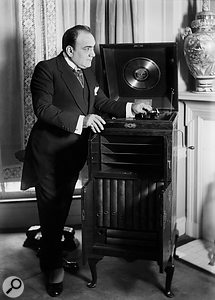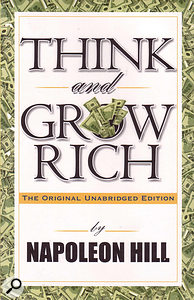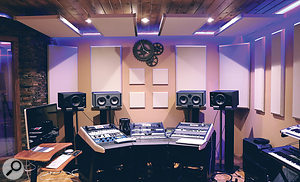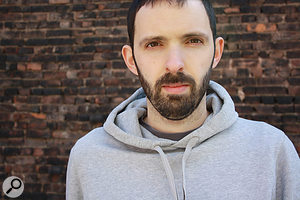 After three days agonising over whether the first note should be notated as a D sharp or an E flat, Harry was beginning to wonder if library music was the ideal career for him.
After three days agonising over whether the first note should be notated as a D sharp or an E flat, Harry was beginning to wonder if library music was the ideal career for him.
Successful library music writers are efficient, productive and reliable as well as musical — all skills you can develop too.
So far in this series, we have looked at how to get started in library music, how it can provide a great full or part-time career, and how different business models work around the world. This month, we’ll talk about how to be a good library music writer: someone who does his or her job well, by making a lot of good music that video editors use, and keeps publishers coming back for more by being good and nice to work with. Those who do their job well have long, successful careers and make a good income, while those who do it badly get spat out of the system by publishers who don’t want them back, so if you want to succeed in the library world, you’ll need to figure out how to be good at it.
Having spent roughly half my 13-year library music career as a writer and the other half as a publisher, I’ve learned a lot along the way from both perspectives, and as well as my own advice, I’ve also sounded out a selection of other established writers and publishers. These tips for being better, more productive and professional apply well beyond library music, so read on for some useful inspiration even if you’ll never take the library route.
How To Be Good
So what does it mean to be a good library music writer? Well, it’s important to market yourself well to the right companies, but this has been discussed in the first two articles. This month, we are looking at how you can be so good at library writing that you’ll be guaranteed success in the years ahead. In a nutshell, to achieve this, your challenge is to write a lot of good, usable music, and be professional.
Writing a lot means aiming for around one track per week — 52 per year — without cutting corners or burning out, by being disciplined and efficient, with healthy work habits. Good music is music that is well produced and well performed (if it is performed); it elicits the right emotional effect, sounds authentic, employs good sounds, is well arranged and well mixed. Usable music is music that is suitable for end use on TV promos, dramas, documentaries, movie trailers and advertising because it is in the right style, captures a mood well, and is in a popular genre. Being professional means being positive, eager, honest, following instructions, doing your research, taking criticism well and sticking to deadlines.
It should be obvious enough that exemplifying the opposite of all these good qualities — writing a small amount of bad music in unsuitable styles while being a liar who ignores instructions, gets defensive at criticism and hands everything in late — won’t get you very far. In the remainder of this article I’ll drill down into each of these core challenges (write a lot, write good, usable music and be professional) while inviting advice from fellow publishers and writers to help your quest to be the best. Or at least, to avoid being so bad that you’re spat out.
Productivity
Anyone who tells you that it’s quality that counts, not quantity, is only half right. There is such a high level of randomness about library music earnings that the odds of hitting a high reliable income only go in your favour once you have hundreds of pieces of music floating under the noses of users around the world. With low quality you’ll certainly have trouble getting very far, but with a low quantity you’ll definitely get nowhere, however amazing you are. Therefore, to be a good library music writer you have to learn how to be productive and write a lot, despite working on your own with no one pulling you up when you’re lazy or distracted.
 Taking the time to develop sketches of your ideas can help you decide which will prove the most fruitful.When you’re highly productive, all kinds of magic happens. You’ll have a better chance of stumbling on a hit album concept. You’ll work with more publishers, and so find ever-better working relationships. Publishers will get to know you and your style and come back to you for more. You’ll have more tracks earning royalties, and you’ll have a good chance of some of your tracks hitting the big time such as a placement on a big ad, theme tune or major movie trailer. Writing fast can also add fluidity to the music, helping it flow together instead of sounding like separate disconnected parts. I’m not talking about cutting corners to achieve a high track count, I’m suggesting that you write quickly while inspired, under the steadying hand of efficient working methods. Producing a lot of dashed-off garbage won’t impress anyone.
Taking the time to develop sketches of your ideas can help you decide which will prove the most fruitful.When you’re highly productive, all kinds of magic happens. You’ll have a better chance of stumbling on a hit album concept. You’ll work with more publishers, and so find ever-better working relationships. Publishers will get to know you and your style and come back to you for more. You’ll have more tracks earning royalties, and you’ll have a good chance of some of your tracks hitting the big time such as a placement on a big ad, theme tune or major movie trailer. Writing fast can also add fluidity to the music, helping it flow together instead of sounding like separate disconnected parts. I’m not talking about cutting corners to achieve a high track count, I’m suggesting that you write quickly while inspired, under the steadying hand of efficient working methods. Producing a lot of dashed-off garbage won’t impress anyone.
Work Smarter, Not Harder
One way to write a lot is through brute force. Start early, work late and through the weekends. There are times when this might be needed on tight deadlines, but the charm of library music is that, unlike TV and film, the deadlines are usually somewhat distant, so you really shouldn’t be forced to work late. Constant long hours will burn you out, remove all the good things in your life (relationships and fun), make you hate music and slow you down with tiredness, so don’t do it. I personally think that most library-music writers work longer hours than they need to, but at least many recognise that it’s not ideal in the long-run. As US trailer music writer Kyle Kniceley says, “I work long hours when necessary to hit a deadline, but it’s important to not force long hours, because I don’t want to resent the work.”
 Ehren EbbagePhoto: Dmitri von KleinMeanwhile, US library writer Ehren Ebbage finds himself working fairly long hours, but is looking for ways to bring them down: “I work around 60 hours a week. I’d like to work less, hence an effort to become more productive and efficient. I’d like to get the same amount of work done in 45 hours per week. Maybe it’s time to delete my Facebook account!”
Ehren EbbagePhoto: Dmitri von KleinMeanwhile, US library writer Ehren Ebbage finds himself working fairly long hours, but is looking for ways to bring them down: “I work around 60 hours a week. I’d like to work less, hence an effort to become more productive and efficient. I’d like to get the same amount of work done in 45 hours per week. Maybe it’s time to delete my Facebook account!”
UK writer Clive Lukover also emphasises the need for balance: “I do work long hours sometimes due to looming deadlines, which is really unavoidable — but things such as sleep and exercise and leisure activities are equally important to charge the batteries.“
Productivity Tips
Perhaps you’re already fast, efficient and focussed. Lucky you. I had to drag myself from being painfully slow and distractible to being fast and fluid, and when I did, my music became much better for it. I achieved all this while reducing my work hours, mainly thanks to three pretty straightforward productivity methods that I developed for myself. They made a huge difference for me, and I’m happy to share them with you now in case they help you:
Productivity tip 1: Make four sketches per track. For every track that you want to write, spend half an hour each on four different initial ideas, recorded as sketches on piano (or whatever your main instrument is), played into the DAW without using a click. In that half hour, 20 minutes might be noodling with ideas and rehearsing while the last 10 might be trying to get a rough performance down which captures something important about the theme, chords, dynamics, rhythm and tempo. Give each sketch a good, evocative title to help you remember what you were thinking of when you did it.
After two hours, you will have four alternative ideas, so choose the best and drop the rest. Starting a big production from the most promising idea will take you to a better destination quicker than working and reworking something that wasn’t so great to start with.
 Get it in writing: noting down your aims can provide you with clear goals and make your writing process more efficient.Productivity tip 2: Write down the key qualities you want your track to have.
Get it in writing: noting down your aims can provide you with clear goals and make your writing process more efficient.Productivity tip 2: Write down the key qualities you want your track to have.
For every new track, complete a document with three headings. Under Dramatic Situation, briefly describe what kind of scene the music is designed to accompany. Add a list of feelings the track is meant to evoke under the heading Emotions. And write a list of Section titles such as ‘Brooding intro’, ‘Panic climax’, with details about what should happen in each section in terms of dynamics, instruments, chords and so on.
This should only take a few minutes to fill out, but it immediately enables you to visualise the whole piece of music and gives your track meaning and structure. Instead of tinkering blind with small sections which can lead anywhere and nowhere, you are working with the overall dramatic and emotional meaning and within a purposeful developing structure. By knowing what you are aiming for, your options are narrowed, your work becomes guided and focussed, it all gets done much quicker and the end result sounds more fluid and coherent. It’s about something, not just music that expresses nothing.
Productivity tip 3: The grid system.
The ‘grid system’ is a simple method I developed that has had a profound effect on my productivity and my life. It’s the main reason I went from writing 10 good tracks a year while working late, to 50 much better tracks per year while keeping evenings and weekends free. The goal of this is to mostly do what you intend and get it done quickly while in the zone, instead of working long hours but spending half of it distracted and losing your focus.
To do this, keep a piece of paper nearby at all times with a grid printed on it, marked out in rows for days and columns for hours. In each box, if you’ve done what you set out to do in that hour, write in a letter or two that tells you what you did in that hour, such as ‘T’ for Trailer album. At the end of the day and the end of the week you’ll be able to see what you’ve been doing: music, admin or wasting time. If you achieved your target number of hours of music (15? 45?), give yourself a small or large reward — some software you wanted, a game, a new mic or a fancy pair of shoes.
 Martin GrattonThis method had dramatic results for me so I’d recommend you try it out if you have trouble getting on with writing. Others find their own methods. UK writer Martin Gratton emphasises being methodical and disciplined: “Having a theme for an album (say, sports, love, or travel) helps to keep creative and keep productivity up, and reusing a template in your DAW can help to keep a consistent feel across library tracks (which editors like) and makes mixing easier and writing faster. Waking early and starting the day writing music helps to avoid working into the night. It’s important not to overdo it as you can lose concentration and motivation.”
Martin GrattonThis method had dramatic results for me so I’d recommend you try it out if you have trouble getting on with writing. Others find their own methods. UK writer Martin Gratton emphasises being methodical and disciplined: “Having a theme for an album (say, sports, love, or travel) helps to keep creative and keep productivity up, and reusing a template in your DAW can help to keep a consistent feel across library tracks (which editors like) and makes mixing easier and writing faster. Waking early and starting the day writing music helps to avoid working into the night. It’s important not to overdo it as you can lose concentration and motivation.”
Meanwhile, UK writer Jamie Salisbury blends deadline fear with methodical planning to get the job done: “I need real deadlines set by other people and not arbitrary deadlines set by myself, as I know they’re not real! Then I take everything I need to do, and break it down, month by month, week by week, day by day and then roughly into hours at the beginning of each day.“
Stay Healthy & Motivated
 Do your research: make sure you are listening to, and learning from, the work that is being done by your competitors and rivals!From experience, some lifestyle improvements can help you write better music quicker. These include a healthy diet, avoiding too much life stress if possible, avoiding too much booze or drugs, getting plenty of sleep and exercise, breaks in the day and holidays to refocus. I also find nutritional supplements work better to get my brain on side than drinking too much coffee, which is short-lived — piracetam, green tea, choline and NAD+ work for me. Writer Ehren Ebbage also advocates healthy habits: “I exercise every day and try to eat well. Not a revolutionary idea, but it makes an enormous difference.”
Do your research: make sure you are listening to, and learning from, the work that is being done by your competitors and rivals!From experience, some lifestyle improvements can help you write better music quicker. These include a healthy diet, avoiding too much life stress if possible, avoiding too much booze or drugs, getting plenty of sleep and exercise, breaks in the day and holidays to refocus. I also find nutritional supplements work better to get my brain on side than drinking too much coffee, which is short-lived — piracetam, green tea, choline and NAD+ work for me. Writer Ehren Ebbage also advocates healthy habits: “I exercise every day and try to eat well. Not a revolutionary idea, but it makes an enormous difference.”
An essential part of being productive is having a long-term goal to give your daily grind a sense of moving towards a worthwhile end result. Wanting to make more money in the future can be helpful even if you are not materialistic, because money gives you the freedom to do things you want to do instead of writing music that you don’t want to write, or that other even more unthinkable bogeyman, having to do a real job. The above graph, from the first month’s article, showing how much money you can earn over the next 15 years by writing library music could be an example of a good motivator. It shows how your earnings should build over 15 years assuming typical income, four excellent albums of 12 tracks per year for good labels and a three-year income delay.
 For those struggling to remain motivated, I also strongly recommend a book called Think And Grow Rich by Napoleon Hill. Written in 1937, it has sold over 100 million copies and although it has a curious style of restrained mania, it hammers home a very useful idea: to write down a couple of sentences summarising how much money you will make, by when, and roughly how, and then repeat this out loud every day. I don’t remember to do this every day but when I do, it returns me to the big picture and quickly reminds me what I need to be doing to get there. Reading this book in 2014 directly altered my course from treating publishing as a hobby to becoming an expansion nut, with six labels and two software companies.
For those struggling to remain motivated, I also strongly recommend a book called Think And Grow Rich by Napoleon Hill. Written in 1937, it has sold over 100 million copies and although it has a curious style of restrained mania, it hammers home a very useful idea: to write down a couple of sentences summarising how much money you will make, by when, and roughly how, and then repeat this out loud every day. I don’t remember to do this every day but when I do, it returns me to the big picture and quickly reminds me what I need to be doing to get there. Reading this book in 2014 directly altered my course from treating publishing as a hobby to becoming an expansion nut, with six labels and two software companies.
If repeating a mantra about how much money you want feels greedy and un-British to you, try to think of it as just a way of focussing your mind on organising your time better on what gets results. I agree that wealth is an empty purpose in itself, but it is also a means to various positive ends: offering interesting work to talented people, buying good software and equipment, working in a nice environment, freeing up time for unpaid pet projects, donating to charities, looking after your dependents and so on.
 Kyle KniceleyWriter Kyle Kniceley also mentions using motivation tactics to stay focussed and productive: “The decision was made to blaze a career path and I’m always keeping that drive in the front of my mind. Plus, I love music and it feels great to finish pieces and then hear them be used... that’s the addiction part of it all.”
Kyle KniceleyWriter Kyle Kniceley also mentions using motivation tactics to stay focussed and productive: “The decision was made to blaze a career path and I’m always keeping that drive in the front of my mind. Plus, I love music and it feels great to finish pieces and then hear them be used... that’s the addiction part of it all.”
Productivity Placement
If you’re not getting enough music written, now you know why. You’re working on small sections of tracks instead of expressing the big picture, you’re getting distracted, eating badly, not doing enough exercise, not sleeping enough, working too late, not setting goals, plans and targets, and are having too much booze and drugs. That might all be fine for rock & roll, but there’s no room for any of that nonsense in the beautiful, square, bread-head world of library music.
Make Yourself Useful
 Publisher and composer eventually resorted to other ways of settling their dispute about the reverb on the marimba.As a publisher, I’ve listened to and worked on thousands of tracks and, clearly, some writers are better than others. I will always offer as much work as the best writers can take and put their work forward to clients first, and I try to avoid ever releasing anything bad by rejecting weak tracks and not offering jobs to writers whose demos I don’t think are up to scratch. All publishers attempt to do the same, so writing good music is essential if you want publishers to release it.
Publisher and composer eventually resorted to other ways of settling their dispute about the reverb on the marimba.As a publisher, I’ve listened to and worked on thousands of tracks and, clearly, some writers are better than others. I will always offer as much work as the best writers can take and put their work forward to clients first, and I try to avoid ever releasing anything bad by rejecting weak tracks and not offering jobs to writers whose demos I don’t think are up to scratch. All publishers attempt to do the same, so writing good music is essential if you want publishers to release it.
Now, perhaps writing good music is not something that can be taught in a magazine article — it requires years of listening and experimentation — but with the help of other publishers and writers, I can at least throw out a few pointers to get you thinking about how you can improve even if you’re already great.
First, anyone wanting to make good music must invest in good sounds and gear, although the level of investment may depend on the style. You can make pretty convincing electronic music on an iPad with a bit of effort, but if you’re making orchestral or other sample-heavy music you need to invest in great libraries. Even then, just having the raw sounds isn’t enough: you also have to get to know them well and ideally customise your presets. You will also need great effects plug-ins to put everything through and a decent computer to run it all on. Recording anything live also means having at least one good mic and a suitable acoustic environment. If, like many writers, you need to do your own mixes, you also need excellent headphones and speakers and an acoustically neutral listening environment.
 As a library music composer, your studio is your workplace and needs to be kitted out appropriately.Obviously, this magazine is a great source of advice about which software and gear to buy, but you also need to do your own research. Listen to developer demos, talk to composer friends, read reviews and forum discussions and take up free trials where possible. Of course great sounds and gear only make great music in the hands of a great composer, but they are necessary if you want to work at the top level.
As a library music composer, your studio is your workplace and needs to be kitted out appropriately.Obviously, this magazine is a great source of advice about which software and gear to buy, but you also need to do your own research. Listen to developer demos, talk to composer friends, read reviews and forum discussions and take up free trials where possible. Of course great sounds and gear only make great music in the hands of a great composer, but they are necessary if you want to work at the top level.
The Importance Of Being Usable
Library music is designed to be used on advertising, movie trailers, TV promos and TV programmes. The most successful music will therefore often be in a relatively uncluttered style, so that it will work under dialogue. Library publishers usually also ask for timed edits — typically, 60, 30 and 15 seconds — and different versions such as percussion only. Making these available really enhances usability by helping the tracks fit easily to clients’ needs.
Whether it’s ads, drama, documentaries, reality TV or trailers, well-produced tracks written with specific uses in mind are likely to be more usable than random noodles. Tastes change, but genres that have done well for my labels over the years include emotional orchestral music, indie pop-rock, ambient music, sound-design-heavy tracks and light, simple music: stuff that’s easy to like, positive and straightforward. Epic Emotional Piano by Chris Haigh has been the most successful album so far on my label Gothic Storm, helped by being in the popular genre of epic, emotional, melodic orchestral music. Genres that are attached to a specific country or era, such as Portuguese Fado or ’60s Bossa Nova could be limiting, but even they could be repackaged into ‘Evocative Acoustic’ or ‘Cheesy ’60s Lounge’ albums that might find a market.
 Mark PetrieIn busy pubs, you get served quicker by going to the middle of the bar even if the queue is deeper, the moral being that following the crowd can be a safe route to success. Thus the surest way to create popular library tracks would be to listen to what’s being used on TV, in trailers, or whatever use you have in mind, and do something similar but better. Not very original, but you might be more likely to succeed than you would by following your latest enthusiasm for say, bowed hosepipe drones. As successful US composer Mark Petrie says: “I’ve been a little too creative with merging genres before. I think that’s generally something to avoid with library music.”
Mark PetrieIn busy pubs, you get served quicker by going to the middle of the bar even if the queue is deeper, the moral being that following the crowd can be a safe route to success. Thus the surest way to create popular library tracks would be to listen to what’s being used on TV, in trailers, or whatever use you have in mind, and do something similar but better. Not very original, but you might be more likely to succeed than you would by following your latest enthusiasm for say, bowed hosepipe drones. As successful US composer Mark Petrie says: “I’ve been a little too creative with merging genres before. I think that’s generally something to avoid with library music.”
That said, doing dazzling experiments for your sanity, vanity and some maverick risk can also pay. Many clients complain about being overwhelmed by bland, uninspired music, and for this reason some library albums have become hits through being novel and ground-breaking.
Be aware, too, of one criticism often levelled at some library music: that it lacks authenticity. This can be caused by writers going too far beyond their comfort zones and passing off pale imitations of genres they don’t know well enough. You have to start somewhere if you intend to learn a new genre, and to create a lot of music you need to be versatile and learn new skills, but you might just do a better job by doing or adapting the styles you know inside out.
As a publisher I’ve heard terrible ‘trailer music’, ‘hip-hop’ or ‘sound design’ demos, only to discover that the same writers have produced incredibly beautiful acoustic or blues music, and snapped them up for that instead, so let your true talents sing. As Andrew Sunnucks, owner of Audio Network, says: “The least successful projects are where there is a whiff of inauthenticity about them.”
Titles Matter
It’s not just the music: good track titles are essential if you want to be successful in library music. When I look through the royalty statements of the thousands of tracks I’ve published, the top tracks always have something clear, evocative and general about their titles. Some of my own most successful tracks are ‘Making Plans’, ‘Gothic Storm’ and ‘Drummers Of God’. Each of those makes a pretty clear statement about its purpose, while being evocative and conjuring mental images yet also being general enough to suggest they could be used in many different situations. Bad library titles are the opposite: either too vague (‘Something’s Happening’ says very little about what to expect), too bland (‘112bpm Rock In E Major’ is almost too boring to read), or too specific (‘Switching On The Pool Lights’, which sounds nice but is not very broad).
Good album titles also make a huge difference. The most successful album titles manage to combine those same essential qualities of being clear, evocative and general. My least successful album as a writer was called Visions Of Beauty: it contained some great tracks, but the title didn’t make clear what it would sound like or what it could be used on.
Turning Pro
 Part of being a good (and therefore successful) library music writer is professionalism. This means having a positive, eager attitude, doing research, following instructions carefully, hitting deadlines, being honest and taking criticism well. Being this way will make your publisher thankful for the lack of stress and wasted time and want you to keep writing as much as possible.
Part of being a good (and therefore successful) library music writer is professionalism. This means having a positive, eager attitude, doing research, following instructions carefully, hitting deadlines, being honest and taking criticism well. Being this way will make your publisher thankful for the lack of stress and wasted time and want you to keep writing as much as possible.
As a publisher, I have not invited back some writers because of a lack of professionalism, after being on the receiving end of defensiveness, lies, not following instructions or missing deadlines. One composer told me he couldn’t hand in his work because he was sick in hospital, forgetting I was a Facebook ‘friend’ and could see his thumbs-up selfie behind the desk at Abbey Road that day... #lyingcomposer #neverinvitedback. There is so much work to do that I can’t afford to waste time chasing up mixes, finding new composers at short notice, fixing errors and arguing. Especially when, however good they are, other writers are better and reliable. A small number of fascinating composers combine defensive arrogance with a lack of self-awareness, and interpret all advice as insults. I’d like to say you know who you are, but you don’t, because you’re deluded.
As publisher Alex Black of EMI Production Music says, “A good healthy working relationship is key, as well as delivering on time, taking constructive feedback well, and not trying to take shortcuts in writing or production.”
Writer Mark Petrie also notes the importance of a good attitude: “I think the biggest ask of a composer in this business is to constantly take on feedback and criticism. It’s important to react positively and to be comfortable making changes to your music.”
Publisher Andrew Sunnucks of Audio Network also emphasises the importance of attitude and friendly relationships: “People with a sense of humour and a totally open mind are always the best at coming up with new and interesting ideas. We think of our writers as a central part of our team and many of them are close friends, which helps hugely. Creative people tend to be fragile and everyone has an ego, but mutual respect between publisher and composer/artist makes what could be awkward conversations easy.”
Back For More
Hopefully, this article will have given you some insights into what it takes to be a good library music writer (that is, write a lot of good, usable music and be professional), with some useful tips on how to achieve those things. Along this disturbing quest for self-knowledge, you have been forced to consider whether you are deluded, talentless and disorganised and need to take brain drugs to cut it in the bread-head library world of cash for tunes. If, after all of this, you are still ready for the challenge, future royalty riches are yours, and which is more, you’ll be a man my son, or woman my daughter. Composers of the world unite! You have nothing to lose but your day jobs!
All About Library Music: Part 1 Getting Started
All About Library Music: Part 2 The Business
All About Library Music: Part 3 The Composer
All About Library Music: Part 4 The Client
Do You Need To Read & Write Scores?
Learning to write musical scores can be helpful if your tracks need live players, but you can get away with hiring an orchestrator instead if it’s not something you need too often. It’s a nice ability to have, especially if you do mainly orchestral music, and it can improve your writing, but it’s not an essential skill for many library writers. Likewise, knowing about harmony, scales and other theory could be a help, but it’s all just a means to an end. If your deep musical knowledge inspires new ideas and helps you make better music, then great. If you use your knowledge as a psychological prop to make you feel superior while outputting bland music, it’s a waste of a good education. Some of the best writers I know have low levels of traditional knowledge, and perhaps by being forced to write by instinct, they’re all the better for it.
It depends on your musical path, too. If you’re writing an authentic jazz album for an ensemble to sight-read, you need the chops. If you’re an audio outlaw making sound design from processed recordings of razor blades slicing live electricity cables, maybe you don’t need no education.
Should You Mix Your Own Music?
In commercial music, tracks are not usually mixed by the writers, but this is common in the library world. Partly this is down to a desire by publishers to keep costs down, but as a publisher myself, I’ve found that so many library writers are capable of producing excellent mixes that I’ve come to rely on and expect that capability, taking over myself in only a minority of cases. Caspar Kedros of BMG Production Music agrees: “We need the writers to supply great mixes.”
Matt Welch of UK independent library publisher Twisted Jukebox also sees the benefit: “My favourite writers deliver a beautifully mixed track, meaning all we need to do is say ‘We love it!’.”
However, other publishers prefer the traditional expensive way with a quality in-house mixer. Andrew Sunnucks of Audio Network says, “We have our very own in-house Grammy-winning genius Ren Swan, and find that many of our composers are eager for him to buff their mixes.” Likewise, Alex Black of EMI Production Music says “We record, mix and edit in our studio.”
The Importance Of Research
 Jamie SalisburyPart of being professional is doing your research: listening carefully to new music, competitors and key tracks in the style of the brief for your planned album. Writer Mark Petrie keeps his quality up by “constantly listening and comparing my work to the top guys. For me that starts with Zimmer and Bergersen.”
Jamie SalisburyPart of being professional is doing your research: listening carefully to new music, competitors and key tracks in the style of the brief for your planned album. Writer Mark Petrie keeps his quality up by “constantly listening and comparing my work to the top guys. For me that starts with Zimmer and Bergersen.”
This sentiment is echoed by writer Kyle Kniceley: “Research is constant. There are new composers all the time that do amazing things, and you have to hear that or you’ll fall behind. I’m a firm believer in feeding the beast: the primal love of music must be fed or it will starve and then you’re left with only ageing sounds and ideas.”
UK writer Jamie Salisbury also does his homework: “Listen to as many top-end examples of the music brief as possible — not just the tracks given as a reference by the library, but construct your own playlist. I’ll often listen to 100-plus tracks multiple times before I begin an album. That’s the standard to reach for, even if it’s multi-million-dollar Hollywood soundtracks.”
Advice From The Experts
In my appeal for tips from successful library writers I received far more than there is space for, but here is a quick summary of further good advice:
- “Strive to make each track your best ever. That attitude, even if it doesn’t always succeed, helps me learn and grow from each experience.” (Mark Petrie)
- “Keep quality high by non-stop education, experimentation and comparison.” (Kyle Kniceley)
- “I use a plug-in called Magic AB to toggle between my track and two or three references. If they make my track sound small I know I have more work to do.” (Ehren Ebbage)
- “Make sure you write something every day, it keeps your skills fresh and will help you write more productively.” (Martin Gratton)
- “Be very critical of your tracks. The minute I doubt an aspect, it’s gone.” (Jamie Salisbury)
- “Feedback is really important and using another pair of ears can highlight lacking elements.” (Clive Lukover)


